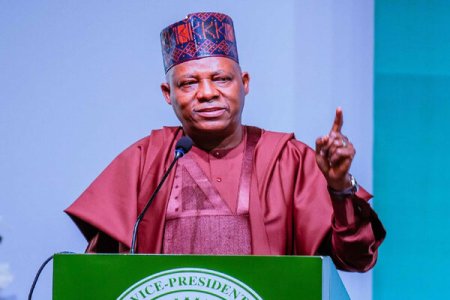
Vice President Kashim Shettima urges Nigerian doctors to resist emigration, emphasizing commitment to improving healthcare. Amidst concerns over medical brain drain to the UK, the Nigerian Medical Association pledges support for government health policies.
In a bid to counteract Nigeria's alarming medical brain drain, Vice President Kashim Shettima has issued a heartfelt appeal to the country's healthcare professionals. Addressing the National Executive Committee of the Nigerian Medical Association (NMA), Shettima urged doctors to resist the allure of emigration and collaborate closely with the current administration to enhance Nigeria's healthcare system.
During a recent meeting at the Presidential Villa, Shettima emphasized the government's unwavering commitment to supporting medical practitioners. He acknowledged the challenges faced by doctors amidst the "Japa syndrome," a term referring to the trend of professionals leaving Nigeria in search of better opportunities abroad.
"The NMA holds a prestigious position in our nation," Shettima remarked, highlighting the crucial role doctors play in advancing healthcare despite formidable obstacles. He urged them to remain steadfast in their commitment to Nigeria, stressing the country's potential and the collective responsibility to strengthen its healthcare infrastructure.
President Bala Audu of the NMA echoed Shettima's sentiments, affirming the association's dedication to collaborating with the government on health policies. "NMA remains deeply committed to our nation and fully supports the health policies of your government," Audu stated, underscoring their role in ensuring quality healthcare delivery and universal access for all Nigerians.
The appeal comes amidst concerning statistics revealing a significant exodus of healthcare professionals to countries like the UK, driven by factors such as better working conditions and quality of life. According to the Development Research and Project Centre, between 2015 and 2022, over 5,000 Nigerian medical doctors migrated to the UK, highlighting the magnitude of the brain drain crisis.
Health Minister Muhammad Pate recently expressed concern over the impact of this migration on Nigeria's healthcare system, attributing its weaknesses in part to the departure of trained professionals who seek opportunities abroad. Pate emphasized the importance of addressing these challenges to sustain healthcare quality and infrastructure in Nigeria.
Shettima's impassioned plea marks a crucial moment in Nigeria's healthcare landscape. The nation's ability to retain skilled professionals and implement effective healthcare reforms will determine its resilience and development in the face of ongoing challenges.





